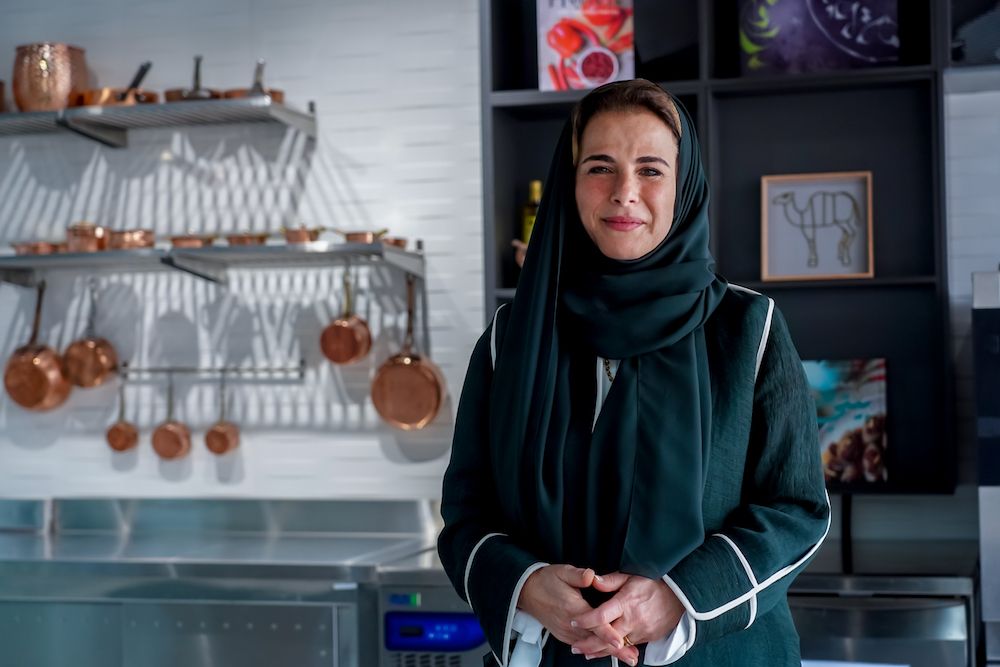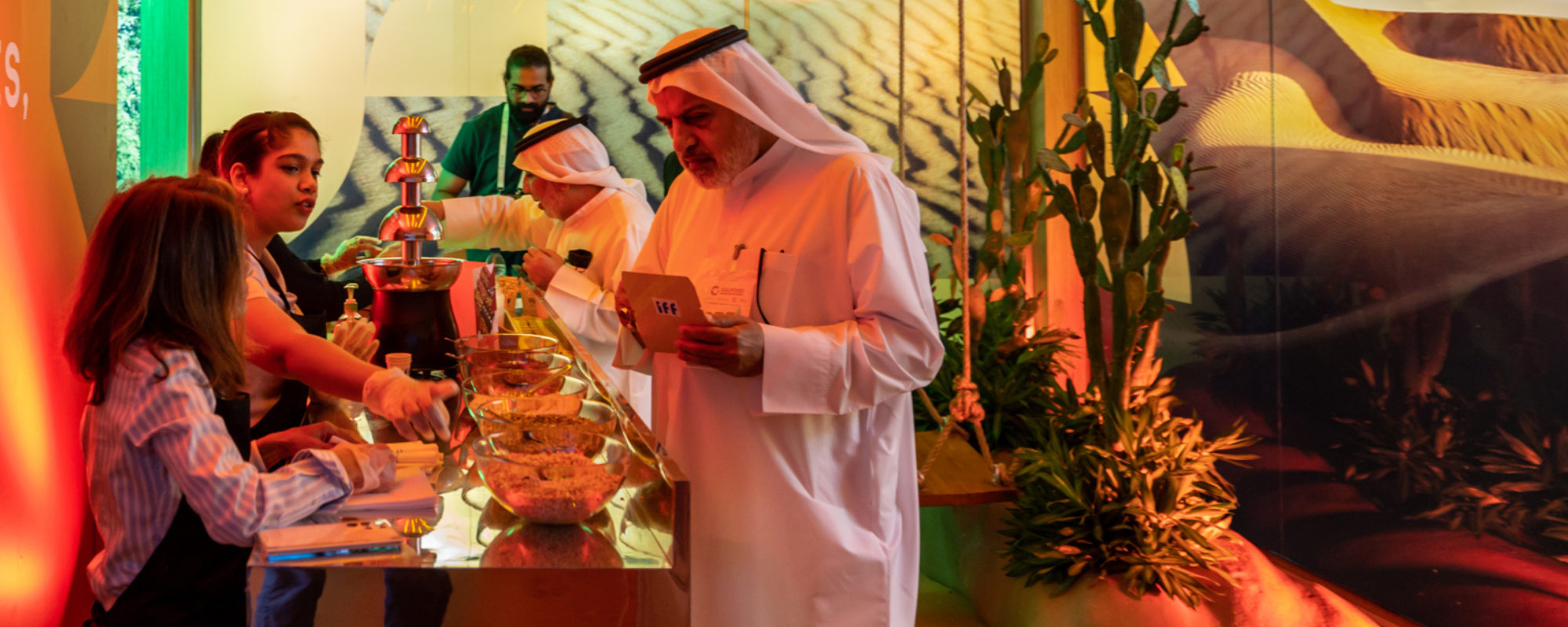From Traditional Roots to Global Heights: Rania Moualla Envisions the Evolution of Saudi Arabian Cuisine on the World Stage

What inspired you to found the ZADK Saudi Culinary Academy, and how has it contributed to the growth of Saudi Arabia's culinary industry into the international culinary stage?
I was inspired to establish the academy after noticing an absence in our heritage’s cuisine, particularly in the food business in Saudi and internationally. There is also a lack of Saudi chefs and a lack of opportunities for professional culinary training in Saudi Arabia.
Since its establishment, the academy has produced a new generation of skilled chefs and culinary professionals. The academy has also contributed to the development of Saudi Arabia's culinary culture by promoting the use of local ingredients and implementation of traditional cooking techniques.
The ZADK Saudi Culinary Academy has also played a significant role in raising the profile of Saudi Arabia's culinary industry on the international stage. The academy's students and alumni have participated in international culinary competitions and events and have won several awards, showcasing the talent and skills of Saudi chefs.
How would you describe the current state of Saudi Arabia's culinary scene, and what changes have you seen in recent years?
Currently, Saudi Arabia's culinary scene has undergone significant changes in recent years, driven by a growing interest in culinary arts, a rise in tourism, and government initiatives to promote the country's cuisine and hospitality industry.
The growth of the food industry in Saudi Arabia has also led to the changes of new culinary trends, such as food trucks, pop-up restaurants, and farm-to-table dining. These trends are gaining popularity among young Saudis, who are looking for new and unique culinary experiences, in addition to the growing interest in traditional Saudi cuisine.
What are some of the unique flavours and ingredients that define Saudi Arabian cuisine, and how do they differ from other regional cuisines in the Middle East?
Saudi Arabian cuisine has a rich, diverse, and a unique blend of spices and flavours that are not found in other regional cuisines. In Saudi Arabia we use local ingredients such as dates, cardamom, and saffron in traditional cooking techniques such as slow-cooking over an open flame or an underground oven, which gives our dishes a unique aroma. These unique flavours sets it apart from other cuisines in the Middle East.
In your opinion, what are some of the biggest challenges facing Saudi Arabia's food sector and young talent today, and how can they be addressed?
The biggest challenges facing Saudi Arabia's food sector in my opinion is:
- Despite the growing interest in culinary arts in Saudi Arabia, there is a shortage of qualified chefs and culinary professionals
- Starting a food business in Saudi Arabia can be challenging, as many young entrepreneurs face limited access to funding and resources, and access to shared kitchen spaces.
- The process of obtaining licenses and permits to operate a food business in Saudi Arabia can be complicated and time-consuming.
Addressing these challenges requires first creating more opportunities for training, education, and entrepreneurship in the culinary arts and joined effort from the government and private sector to provide support and resources to our young talents in the food sector.
How do you see the relationship between traditional Saudi Arabian cuisine and the global food industry evolving in the coming years?
Saudi Arabian cuisine is becoming more popular globally and traditional Saudi Arabian dishes such as Harees, Jareesh and Kabsa have become more known and appreciated.
Our young chefs are innovating and creating new and exciting dishes that showcase the diversity and richness of Saudi Arabian cuisine
As the global food industry continues to evolve and new culinary trends coming up, traditional Saudi Arabian cuisine will evolve as well, while still staying true to its roots and unique identity.
What role do you think culinary education and training programs like the ZADK Saudi Culinary Academy can play in fostering innovation and growth in the food industry?
In ZADK, culinary education and training programs have the potential to play a big role in fostering innovation and growth in the food industry in Saudi Arabia and beyond in many ways:
- Our programs provide our students the skills and the knowledge they need to excel in the culinary arts and to become innovators in their field
- Our students learn the international cuinlary program in addition to our traditional techniques and flavours
- Our students are equipped with the tools they need to create new and exciting dishes and to push the boundaries of what is possible in the culinary arts
How have recent shifts in consumer preferences, such as a growing interest in health and sustainability, impacted Saudi Arabia's culinary industry, and how are businesses responding to these trends?
There is a growing interest in health and sustainability, many restaurants and food businesses in Saudi Arabia are responding to the growing interest in health by offering healthier options on their menus. Some dishes have lower calories, fat, and sugar, as well as gluten-free or vegan options, and using locally-sourced ingredients, which reduces food waste.
What advice would you give to young entrepreneurs and aspiring chefs who are looking to break into the Saudi Arabian culinary space? What do they need to look for?
My advice to our young entrepreneurs and aspiring chefs:
- Get an education and be open to learning; even the most talented and experienced chefs can always learn something new
- It is important to be open to new ideas and to continually seek out opportunities to learn and grow, whether through culinary training programs, apprenticeships, or by working alongside other experienced chefs, and make sure you do work at least two years before you open your restaurant
- Stay true to your vision: It is important to have a clear vision of what you want to achieve and to stay true to that vision
- Focus on quality: In the culinary industry, quality is key. Whether you're sourcing ingredients, preparing dishes, or creating a dining experience for your customers, it is important to prioritize quality in everything you do
- Embrace innovation: The culinary industry is always evolving, so it is important to stay on top of emerging trends and new technologies
- Build strong relationships: Finally, the culinary industry is built on relationships, whether with suppliers, customers, or other chefs and professionals in the industry. Building strong relationships based on trust, respect, and mutual support can be the key to success in the culinary space
In your opinion, why do you believe that now is the right time to enter Saudi Arabia’s food sector?
I believe now is the right time to enter Saudi Arabia’s food sector due to how close we are to vision 2030. We have a growing economy with a young, diverse, population who can capitalize off the rich food culture the Kingdom has. The wealth of flavours in Saudi cuisine will be a prominent aspect of the transformation in vision 2030.
Finally, what exciting projects or initiatives is the ZADK Saudi Culinary Academy currently working on, and how do they fit into your broader vision for the future of Saudi Arabia's culinary industry?
ZADK Saudi Culinary Academy’s main focus is to maintain providing high-quality culinary education to the next generation of chefs and culinary professionals, and to prepare the Saudi chefs to excel in their jobs.
We want to keep working on promoting our local cuisine and ingredients, innovation, support entrepreneurship, and help building a strong and vibrant culinary industry in Saudi Arabia; one that can compete globally while also preserving and promoting our local food traditions and culture.
The Academy also aims to showcase traditional dishes and ingredients, and by supporting local farmers and producers. We have hosted a range of culinary events and competitions, including the Saudi Culinary Olympics, which brings together chefs and culinary professionals from around the world to showcase their skills and creativity.
We are also working with our international advisory board to contribute significantly to the growth and development of Saudi Arabia's culinary industry and by providing professional culinary education, promoting local ingredients and cooking techniques, and raising the profile of Saudi chefs on the international stage.
Join us at The Saudi Food Summit and witness Rania live on stage from June 20th to 22nd, 2023, at The Riyadh International Convention & Exhibition Centre in Riyadh, Kingdom of Saudi Arabia. Explore the latest culinary trends, innovations, and opportunities in the foodservice and hospitality industry.






